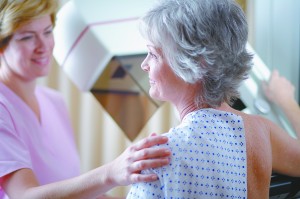 InterCommunity Cancer Centers and Institute Celebrates National Breast Cancer Awareness Month by Educating Women about the Benefits of Mammograms
InterCommunity Cancer Centers and Institute Celebrates National Breast Cancer Awareness Month by Educating Women about the Benefits of Mammograms
According to the American Cancer Society, breast cancer is one of the most common cancers affecting women today. In 2014, an estimated 262,270 new cases of invasive breast cancer will be diagnosed in American women and approximately 40,000 women will die from it. The good news is that with regular breast cancer screenings, most women can significantly increase their chances of beating the disease.
In celebrating October as “National Breast Cancer Awareness Month,” InterCommunity Cancer Centers and Institute is educating women about the benefits of mammograms and dispelling the most common myths about them.
For some women, the thought of having to schedule their annual mammogram is as painful as getting their wisdom teeth pulled. However, despite the millions of excuses they may have for wanting to cancel their appointment, there are many more important reasons why they should keep it. Maureen Holasek, M.D., medical director of ICCI in Clermont, is no stranger to the countless excuses and myths women have about mammograms and she has decided to respond to a list of the 10 she most commonly hears from patients.
1. I am too young to have breast cancer?
Breast cancer does not discriminate by age, race or religion. While it is most common in women who are 55 years of age or older, it can still afflict younger women too. There are different guidelines about when to begin undergoing mammograms so ask your doctor what’s right for you.
2. I have no family history so why do I need to be screened?
There is a greater risk of you getting breast cancer if it runs in your family, especially if your sister or mom had it. However, approximately 85% of women who are diagnosed have no family history of the disease. Why take the risk?
3. I am extremely healthy and exercise everyday.
Outstanding! You’re on the right track, but why not go that extra mile to ensure that you’re as healthy as you think? While diet and exercise will reduce your risk, it does not eliminate your chances completely.
4. I’m way too busy.
On average, mammograms only take 15-30 minutes and those minutes may turn into additional years on your life if the breast cancer is detected and treated in its earliest stages.
5. I can’t afford a mammogram?
Mammograms are now free under the health care reform law (the Affordable Care Act) and with no deductibles and copays. Medicare also covers mammograms.
6. The radiation is too risky.
We may be exposed to more radiation from our cell phones than we are from mammograms. So if you refuse to give up your cell phone, why not use it to schedule your next appointment. It could be a lifesaver.
7. I do regular self-exams and never feel any lumps.
I’m proud that you’re being so proactive about your breast health, but mammograms can find even the smallest tumors up to three years before you can feel them. The earlier we can find the tumor the greater the chance we have at successfully treating them.
8. Mammograms will not help because my breasts are too dense.
Mammograms are far from useless. While they are not as effective in detecting breast tumors in dense breasts, the addition of an ultrasound or MRI helps to detect nearly 100% of cancers.
9. It’s uncomfortable and painful.
A mammogram is quick and the pain, if any, is brief. However, you can further reduce your level of discomfort by scheduling it when your breasts are less sensitive, taking an aspirin or over-the-counter pain reliever before your screening, and most importantly, Let the radiologist know that you might be sensitive. He or she might be able to make the mammogram a more positive experience.
10. I am too afraid of what my screening may find.
Having to face a potencial breast cancer diagnosis is frightening to us all. But let’s not jump to conclusions because you may never receive the bad news you fear. And if you do, by getting your annual mammogram you will have significantly increased your chances of beating the disease.
THE EXPERIENCE OF INTERCOMMUNITY
CANCER CENTERS
ICCC has 25 years of cancer-fighting experience having treated over 10,000 patients. They are dedicated to empowering patients to have the confidence they need to change their lives. Radiation Oncologists Drs. Hal Jacobson, Herman Flink, Maureen Holasek and Alison Calkins bring exceptional expertise in treating breast, lung, prostate, gynecologic, skin and other cancers.
As part of a larger, nation-wide oncology group of physicians and specialists under Vantage Oncology, the oncologists at ICCC have access to aggregated clinical information and best practices from the treatment of more than 1,000 patients per day, enabling them to develop highly-effective and peer-collaborated treatments. This gives many of the centers that work with Vantage, including ICCC, the ability to offer university-quality treatment services in smaller and more rural areas. It gives local communities exceptional services closer to home and in a non-hospital setting. To learn more, please visit www.ICCCVantage.com.
ABOUT VANTAGE ONCOLOGY
Vantage Oncology offers a complete development, implementation and management solution for radiation oncology practices. It provides ownership opportunities that empower physicians to maintain control of their practice while leveraging the strength of the company’s network and clinical resources. A multi-disciplinary team is committed to continuously raising the standards of cancer care. For more information, please visit www.VantageOncology.com.
Tags featured
Check Also
Recurrent UTIs: Addressing the Risk of Antibiotic Resistance
Urinary tract infections (UTIs) are common bacterial infections that affect millions of individuals worldwide each …
 Central Florida Health and Wellness Magazine Health and Wellness Articles of the Villages
Central Florida Health and Wellness Magazine Health and Wellness Articles of the Villages



